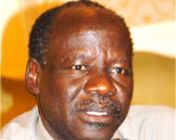Darfur peace deal possible by end of April – FM
Mar 17, 2006 (NAIROBI) — Sudanese Foreign Minister Lam Akol said on Friday he was optimistic about striking a peace deal with rebels in Nigeria within weeks to end a three year-conflict in Darfur which has led to the death of thousands of people.
 Speaking in a press briefing here on the sidelines of an Inter-Government Authority on Development (IGAD) Council of Ministers meeting, Akol said the peace talks underway in Abuja, Nigeria, between rebels from Sudan’s western Darfur region and the Sudanese government, may result in a peace deal by the end of April.
Speaking in a press briefing here on the sidelines of an Inter-Government Authority on Development (IGAD) Council of Ministers meeting, Akol said the peace talks underway in Abuja, Nigeria, between rebels from Sudan’s western Darfur region and the Sudanese government, may result in a peace deal by the end of April.
However, Akol admitted that a peace deal may not end the violence, due to a splintering of rebel factions and called for apolitical compromise between the negotiating parties.
“We hope that before the end of April, the political solution will be available in Darfur because of all the stakeholders including the African Union (AU) have agreed that we must give priority to the realization of peace in Darfur,” Akol said.
The minister said that wide strides have been made during the current round of talks concerning the sharing of wealth and power and the security arrangements’ agreement.
He said that a road-map for solving Darfur conflict is to be formulated with the participation of the United Nations, the AU,the Sudan government and the rebel movements.
“A number of steps have been taken. The AU will name a five-man committee comprising the current chairman including some heads of state to raise the profile of the peace so that both parties can see the importance of the talks,” he said.
“So we are optimistic that in the next few weeks, we should expect a breakthrough as far as Darfur talks are concerned,” Akol told journalists.
He said that the two main rebel groups and the Sudanese government, which started a seventh round of talks in Abuja early this year, are closer on many issues on the negotiating table –including sharing power and oil wealth.
Among the reasons for his guarded optimism was that after the peace deal between the north and south, Sudan’s National Unity Government has included the Sudan People’s Liberation Movement, creating a “different political climate.”
However, the possibility of independence — envisioned in southern Sudan where a referendum on secession is due within six years of the peace deal — was not for Darfur.
Akol appealed to donors not to peg their assistance to the resolution of the Darfur conflict, lamenting that the southern Sudan has only received 30 percent of the pledges made during the Oslo donors’ conference.
“The international community should not ignore the southern conflict because of the conflict in Darfur. The donors also should not tie their assistance or the pledges they made in Oslo on the resolution of the conflict in Darfur,” he said.
“We are concerned about our people in Darfur and elsewhere. We are concerned about their welfare. We want to stop their suffering as soon as possible and that is why we are striving to see that this conflict is brought to a speedy end,” Akol said.
The minister said his country will reject the propose deployment of UN forces to Darfur even after the African Union’s peacekeeping mandate expires in September.
He said that the AU forces are working in coordination with all the parties and within the context of cooperation with the international community and the United Nations to solve the issue of Darfur.
“The AU should continue doing its job in Darfur because it has not said it’s unable to do its job. The AU has been there for more than a year. We need to hear from AU that they don’t have the capacity, it cannot do its job and then we can agree on how to handle the matter,” he said.
He stressed that the presence of the AU forces was upon the agreement of the Sudan government and in accordance with a specific mandate for monitoring the ceasefire protocol, which was signed by the parties of the conflict in Darfur.
His comment conflicts with the agreement announced in Addis Ababa last Friday, when Sudan and the AU agreed to extend the mandate of the AU peacekeepers in Darfur to September, and then allow them to be merged into a larger United Nations force.
The 7,000-strong AU force, which was deployed in 2004, has been suffering from poor funding and inadequate resources to contain the escalating bloodshed in Sudan’s western region.
The Khartoum government has long opposed a UN force replacing the AU mission in Darfur.
The war in Darfur broke out in February 2003, when some groups launched a rebellion against Khartoum and were put down by the Sudan government.
Nearly 300,000 people have died and 2.4 million made refugees in the civil war that has enveloped the western Sudan province over the past three years.
(Xinhua/ST)
